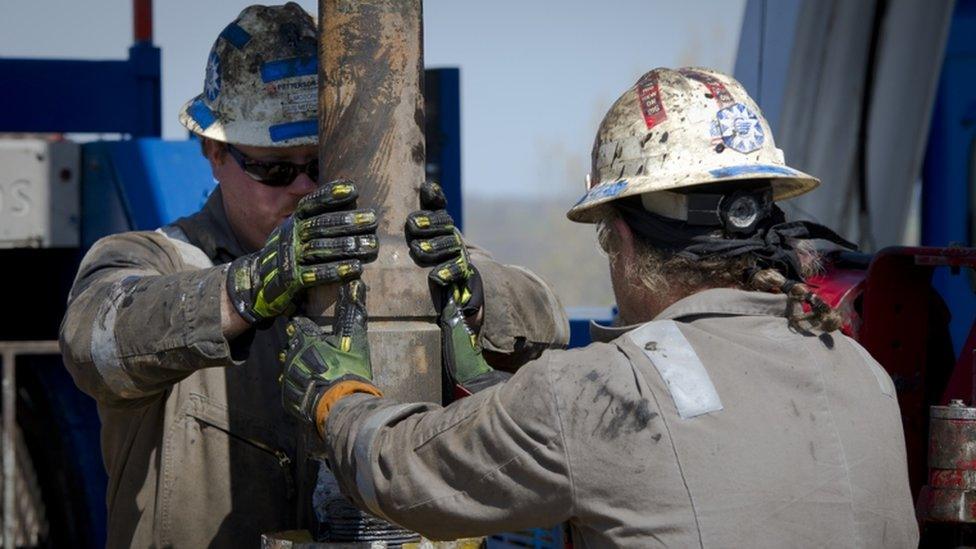Energy firm Ineos astonished over government's stance on fracking
- Published
Tom Pickering from Ineos said he was astonished to hear that the Scottish government had not banned fracking
Petrochemical firm Ineos said it was "astonished" to hear that the Scottish government had not banned fracking.
The statement was made outside the Court of Session where the company has been challenging the moratorium in Scotland on the controversial practice.
Ineos and Reach CSG claim ministers acted illegally in announcing the block in October 2017.
Government lawyers told the court a ban was not in place and that a final position had yet to be adopted.
Tom Pickering, who is operations director for Ineos Shale, said that that claim represented a "staggering U-turn".
He explained: "The position of the Scottish government that has now been stated in court represents a staggering U-turn on the policy direction announced by the energy minister during parliamentary debate in October last year and by the first minister when she said in parliament 'Scotland should welcome the fact that fracking in Scotland is banned'.
"The Scottish people and parliament may find this revelation barely believable when the government has repeatedly told Holyrood that there is an effective and immediate ban."
The Scottish government announced a moratorium - or temporary halt - on fracking in 2015 while it sought the opinions of experts and the public on whether the controversial oil extraction technique should be allowed in Scotland.
After considering the evidence for two years, ministers concluded there was "overwhelming opposition" and announced what was described at the time as an "effective ban", enforced via planning powers. First Minister Nicola Sturgeon later told the SNP conference that "fracking is now banned in Scotland".
According to papers lodged at the Court of Session, Ineos argued that the October announcement represented a change of policy by the government.
They want Lord Pentland to declare that the government acted unlawfully by doing so, and also want the court to declare that it is unlawful for ministers to use planning powers to prohibit fracking in Scotland.
'Not yet adopted a position'
James Mure QC, acting for the Scottish government, told the court that ministers had actually only announced their "preferred position", saying the ministerial statements about an "effective ban" were a PR "gloss".
He said: "It is the language of a press statement. What they have done is to announce a preferred position on the issue.
"They have not yet adopted a position. Any position which the government will take has to undergo an environmental and strategic assessment.
"The court should therefore allow the policy-making process to go to finalisation which is expected in October this year."
Speaking following the conclusion of arguments at the court on Thursday, Mr Pickering said: "Sadly we seem to have reached the Alice in Wonderland situation where a business has to go to the Scottish courts to establish whether announcements in Holyrood can be taken at face value."
A Scottish government spokesman declined to comment further on the legal case.
Environmental groups have weighed in on the side of the government, with lawyers for Friends of the Earth contending that a ban is lawful and necessary to meet Scotland's emissions targets.

What is fracking?
The BBC's David Shukman explains how fracking works
Hydraulic fracturing, or fracking, is a technique used to recover gas and oil from shale rock by drilling down into the earth before directing a high-pressure water mixture at the rock to release the gas inside.
Water, sand and chemicals are injected into the rock at high pressure which allows the gas to flow out to the head of the well, where it can be collected.
Fracking allows drilling firms to access difficult-to-reach resources of oil and gas, and has been credited with significantly boosting US oil production.
But opponents point to environmental concerns raised by the extensive use of fracking in the US.
They say potentially carcinogenic chemicals used in the process may escape and contaminate drinking water supplies around the fracking site, although the industry argues any pollution incidents are the results of bad practice, rather than an inherently risky technique.
There have also been concerns that the fracking process can cause small earth tremors.
And campaigners say the transportation of the huge amounts of water needed for fracking comes at a significant environmental cost.
- Published8 May 2018
